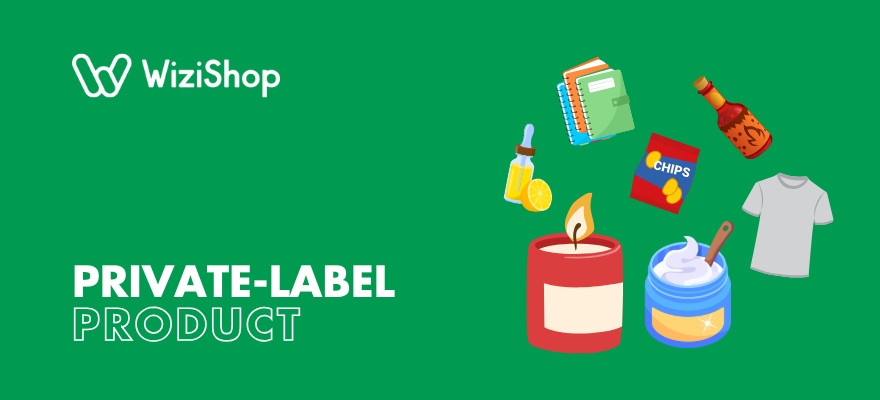Key points in this article:
- Private‑label products are manufactured by one company and sold under another brand’s name, giving the retailer control over branding and packaging.
- Some of the benefits of private-label products are higher profit margins, stronger brand control, better market differentiation, and increased customer loyalty.
- However, starting a private‑label business entails higher upfront costs, longer time to market, and inventory/supply‑chain risk compared to simply reselling existing branded goods.
- Examples of popular private-label products include clothing, jewelry, home decor, stationery, kids’ toys, packaged food, skin care, phone accessories, candles, and travel products.
- Starting a private-label business involves identifying a niche, researching products, finding suppliers, designing your brand/packaging, setting up sales channels, launching and marketing, then scaling and optimizing.
Starting a private-label business is a smart way to build unique products under your own brand and stand out in a sea of competition. Instead of simply reselling goods, you apply your own labels, design, and messaging to create something truly yours.
Many brands choose this approach to boost recognition, increase profit margins, and maintain high control over product quality. Regardless of if you’re just about to start or looking to expand an existing business, private labeling opens doors to customization and creativity!
In this guide, we’ll cover everything you need to know to confidently explore and succeed with private-label products.
What is a private label?
Definition
Private label: Refers to a product that is manufactured by one company but sold under another company’s brand name.
In this arrangement, the retailer or brand owner controls the product’s branding, packaging, and marketing, while the manufacturing is outsourced to a third-party producer.
This model allows businesses to create and sell unique branded offerings without investing in production facilities or complex supply chains.
Private labeling is common in sectors such as cosmetics, food, apparel, and other consumer goods, enabling companies to differentiate their offerings, build brand loyalty, and achieve higher profit margins.
It provides an efficient means for e-merchants and retailers to expand product lines and strengthen brand identity while maintaining control over pricing and presentation.
Differences between private-label and white-label products
Private-label and white-label products are often confused, but they differ mainly in customization and exclusivity.
- Private-label products are created by a manufacturer but branded and marketed exclusively by one retailer. The brand owner can often customize the product’s formulation, features, packaging, and design. These products are unique to that brand, giving the seller more control and differentiation in the market.
- White-label products, on the other hand, are generic products made by a manufacturer and sold by multiple retailers under their own branding, usually with minimal or no changes to the product itself. White-label goods are essentially “ready-made” products that can be rebranded quickly but are not exclusive.
Put simply: private-label = exclusive and customizable; white-label = rebrandable and mass shared.
Advantages of private-label products
Private labeling offers e-tailers numerous advantages, whether they’re looking to launch a new business or expand their existing product line.
More brand control
With private-label products, the retailer has full control over branding, packaging, and marketing.
You can design a product that reflects your brand’s identity, values, and aesthetic. This control extends to labeling, packaging materials, and even minor product features, helping you create a cohesive brand experience for customers.
Strong branding not only improves recognition but also communicates quality and reliability. This level of customization is particularly valuable for building a memorable brand presence in competitive markets, as it allows your products to stand out and align perfectly with your target audience’s expectations.
Higher profit margins
Another major benefit of private-label products is that they can generate significantly higher profit margins than selling third-party brands because you control pricing and eliminate some middlemen.
By sourcing directly from manufacturers, you often pay lower production costs than retail prices, giving you more flexibility to set competitive yet profitable pricing.
Furthermore, branded products can command a premium if marketed effectively. Higher margins allow you to reinvest in marketing, product development, or customer acquisition, supporting sustainable growth.
Over time, consistently profitable private-label products can become a reliable revenue stream, reducing dependence on wholesale suppliers and improving your overall business financial health.
Greater customer loyalty
Selling unique, branded products fosters stronger customer loyalty. When consumers identify your private-label goods as exclusive to your brand, they’re more likely to return for repeat purchases.
Unlike generic products available elsewhere, your private-label offerings create a sense of brand attachment, reinforcing trust and satisfaction. Loyal customers are not only more likely to buy again but may also recommend your brand to others, increasing organic growth.
According to a 2023 Statista survey, word-of-mouth marketing was the top source of brand discovery for shoppers in the United States, reaching approximately 36% of respondents.
When you deliver quality and unique products under your brand on a consistent basis, you can cultivate a dedicated customer base that values your store for its original offerings rather than just convenience or price.
Better market differentiation
Private labeling can help your business stand out in crowded markets. Offering things exclusive to your brand allows you to differentiate yourself from competitors with widely available or generic goods.
Differentiation can be based on product design, quality, packaging, or added features that reflect your brand’s personality. Unique products attract customers looking for something new or better tailored to their needs, giving your store a competitive edge.
Strong differentiation also reduces direct price competition since your offerings are exclusive. As time goes on, this aids in establishing your brand as an authority or specialty provider in your niche, strengthening market positioning.
Increased flexibility in product range
Finally, private-label products give you the freedom to expand or adapt your offerings quickly.
You can respond to market trends, seasonal interest, or customer feedback without waiting for manufacturers to make changes to their standard product lines. This flexibility enables experimentation with new variations, formulations, or designs, allowing you to test what resonates with your audience.
It also makes it easier to scale your product line strategically, adding complementary items or discontinuing underperforming ones. Such control ensures that your brand stays relevant and competitive, helping you seize emerging opportunities and maintain a product range that aligns closely with customer expectations.
Disadvantages of private-label products
Despite the many advantages of private labeling in ecommerce, there are several disadvantages that you’ll want to consider if you want to start your own private-label business.
Higher upfront costs
Launching a private-label product often requires a significant upfront investment. Costs can include product development, packaging design, minimum order quantities from manufacturers, and initial marketing campaigns.
With this kind of venture, you bear the risk of paying for inventory that may not sell immediately. For small or new ecommerce businesses, this can strain cash flow and make budgeting challenging.
In addition, investing in professional branding, photography, and promotional materials adds to initial expenses. While private labeling can be profitable long-term, the upfront financial commitment and risk of unsold stock are important considerations for new entrepreneurs.
Longer time to market
Wanting to launch your online store soon? Private labeling may prove disappointing in this regard.
Developing and launching private-label products usually takes longer than reselling ready-made items. You must coordinate with manufacturers, approve samples, design packaging, and sometimes comply with regulatory or safety standards.
This process can take weeks or even months, delaying revenue generation. Unlike white-label or third-party products, which are often ready to ship immediately, private-label items require careful planning and production oversight.
Delays in manufacturing or shipping can further extend the timeline. For businesses aiming to respond quickly to trends, this slower time to market can be a major disadvantage, especially in fast-moving industries like fashion or electronics.
Inventory and supply-chain risk
It’s important to know that private-label products require careful management of inventory and supply chains. Since you control production, any disruptions, e.g., delays from manufacturers, shipping issues, or quality problems, can directly affect your business.
Overstocking can tie up capital and lead to excess inventory, while understocking can result in missed sales and dissatisfied customers.
Unlike reselling established brands with multiple distribution channels, private-label products rely heavily on your chosen supplier. This dependence can boost operational risk, requiring robust planning and strong relationships with manufacturers.
Businesses must also account for storage, warehousing, and fulfillment logistics, adding complexity compared with simply listing third-party products.
21 Examples of private-label products
Wondering what to sell when it comes to private-label goods? Here are some popular product ideas to inspire your future business!
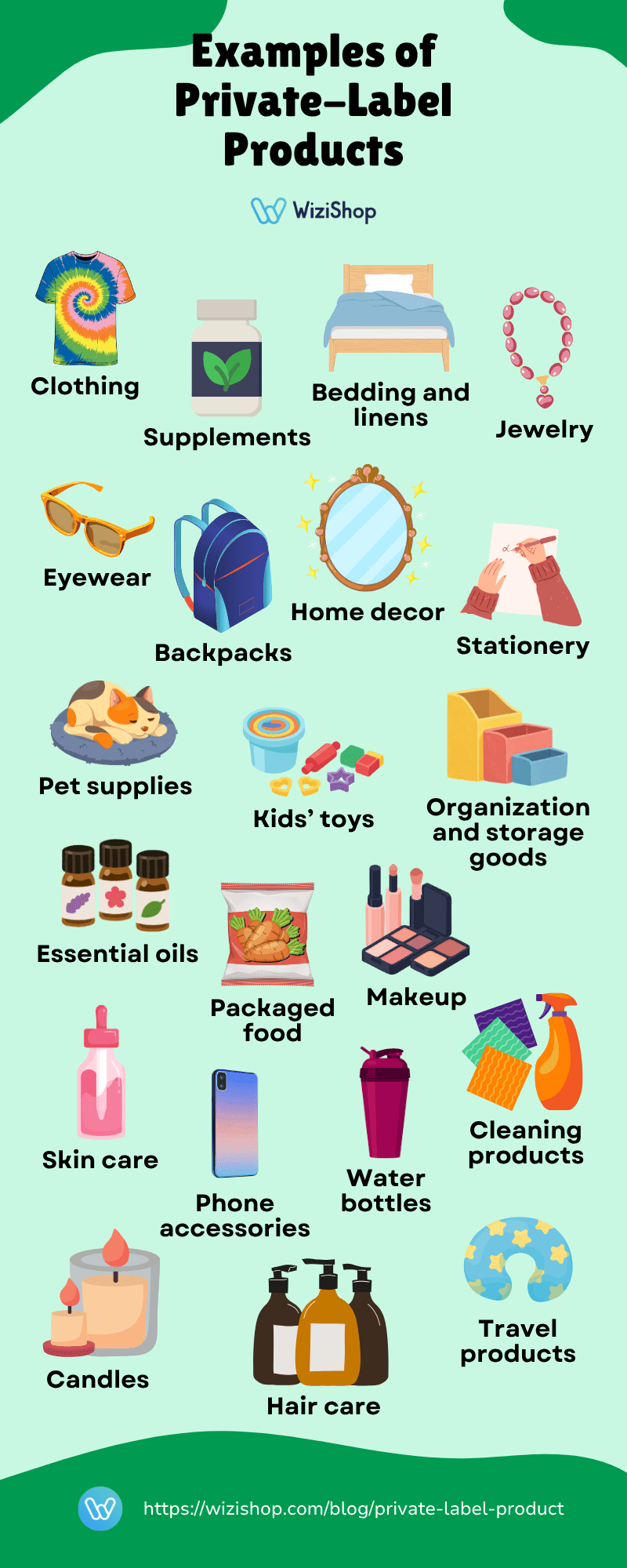
- Clothing: Specialize in items like graphic tees, custom embroidery, kids’ clothing, or accessories. Focus on specific niches, such as sustainable fashion, athleisure, streetwear, or plus-size apparel.
- Supplements: Consider various concerns, such as energy, sleep, gut health, immune support, fitness, etc. You might decide to sell supplements in the form of capsules, multivitamins, collagen, probiotics, or plant-based protein, for example.
- Bedding and linens: Offering things like luxury hotel-quality sheets, organic cotton bedding, weighted blankets, or seasonal comforters can help consumers get a better night’s sleep—crucial to physical and mental wellbeing.
- Jewelry: Necklaces, rings, bracelets, earrings… Jewelry is emotional, giftable, and supplies endless style variety. Whether you’re into minimalist everyday pieces, birthstone jewelry, personalized name necklaces, or bold statement styles, there’s something for everybody!
- Eyewear: Help shoppers improve their vision experience in style by offering sunglasses, blue-light glasses, reading glasses, prescription frames, or fashion eyewear on your company’s digital commerce site.
- Backpacks: Travel backpacks, school bags, laptop backpacks, hiking packs, or minimalist everyday carriers all continue to be hot goods for online sellers due to them being practical, widely used, and easy to differentiate through design and features.
- Home decor: With shoppers constantly looking for ways to personalize their living spaces, you can create an online store featuring anything from wall art, throw pillows, and candles to decorative accents, mirrors, and small furniture pieces.
- Stationery: Offer goods like notebooks, planners, pens, sticky notes, greeting cards, and desk accessories, featuring creative themes and seasonal collections to encourage repeat purchases and build brand loyalty among students, professionals, and hobbyists alike.
- Pet supplies: It’s no secret that many consumers prioritize caring for and spoiling their pets, being on the lookout for high-quality toys, grooming tools, collars, beds, treats, and feeding accessories.
- Kids’ toys: With safety standards and trending themes, toys for kids can be a great niche, as they encourage repeat purchases as children grow and interests evolve. Think product ideas like puzzles, building sets, educational toys, plushies, and outdoor play equipment.
- Organization and storage goods: As people seek to declutter and optimize their spaces, goods such as closet organizers, storage bins, drawer dividers, shelving units, and desk organizers are becoming increasingly popular, appealing to homeowners, renters, and office workers aiming for tidy, efficient environments.
- Essential oils: Health-conscious customers seeking relaxation, skin care, and holistic remedies often turn to essential oils in scents like peppermint, lavender, citrus, eucalyptus, rose, sandalwood, and others. As a private-label seller, you might choose to feature single oils, blends, diffusers, and/or wellness kits.
- Packaged food: Consumers appreciate convenient, specialty, and gourmet packaged-food options that can be delivered to their door in the form of snacks, meal kits, health foods, artisanal treats, and dietary-specific food products.
- Makeup: Lip products, foundations, eyeshadow palettes, blushes, and makeup brushes are all examples of goods you might sell in the makeup niche as a private label. With creative branding, shade variety, and product bundles, makeup encourages repeat purchases and appeals to a wide range of styles and skin tones.
- Cleaning products: Assist shoppers in keeping their living spaces sparkling clean by offering effective, eco-friendly solutions in the form of surface sprays, dish soaps, laundry detergents, cleaning wipes, and reusable cleaning tools.
- Skin care: As consumer interest in having healthy, glowing skin grows, cleansers, facial moisturizers, body lotions, body washes, serums, masks, bath bombs, and body scrubs, especially those with targeted formulas and attractive branding, can be profitable goods to offer for sale on the internet.
- Phone accessories: Frequent phone upgrades and personalization trends make phone accessories phone cases, screen protectors, chargers, pop grips, and portable power banks in demand with shoppers around the world.
- Water bottles: As water bottles are used daily, easy to customize, and popular among wellness and sustainability-focused consumers, they provide plenty of profitability potential for aspiring ecommerce retailers. Consider selling goods such as insulated bottles, shaker bottles, glass bottles, collapsible travel bottles, and even kids’ designs.
- Travel products: Want to appeal to frequent travelers, commuters, and vacationers seeking convenience and comfort on the go? Sell stylish-yet-practical travel accessories like packing cubes, toiletry bags, neck pillows, luggage tags, travel organizers, and passport holders.
- Candles: Candles are another popular private-label ecommerce product due to their wide appeal, low production cost, and strong gift potential. Sellers can hop on this trend by offering, for instance, scented candles, soy candles, decorative candles, aromatherapy blends, or seasonal collections.
- Hair care: Products in the hair care niche perform well in private labeling because customers regularly restock items and experiment with new formulas. Possible goods to consider including in your product catalog are shampoos, conditioners, hair masks, styling creams, oils, and scalp treatments.
How to launch a private-label business in 7 steps
Launching a private-label business can be a smart way to start selling products without creating them from scratch.
Here’s a clear 7-step guide to help you begin!
1. Identify your niche
To start, you will need to focus on a specific product category or segment, looking for products that have strong demand but aren’t oversaturated with competing brands.
You can use research tools like Google Trends to see what’s gaining momentum, Amazon Best Sellers to observe top-performing goods in various categories, and social media insights to discover what people are talking about and sharing.
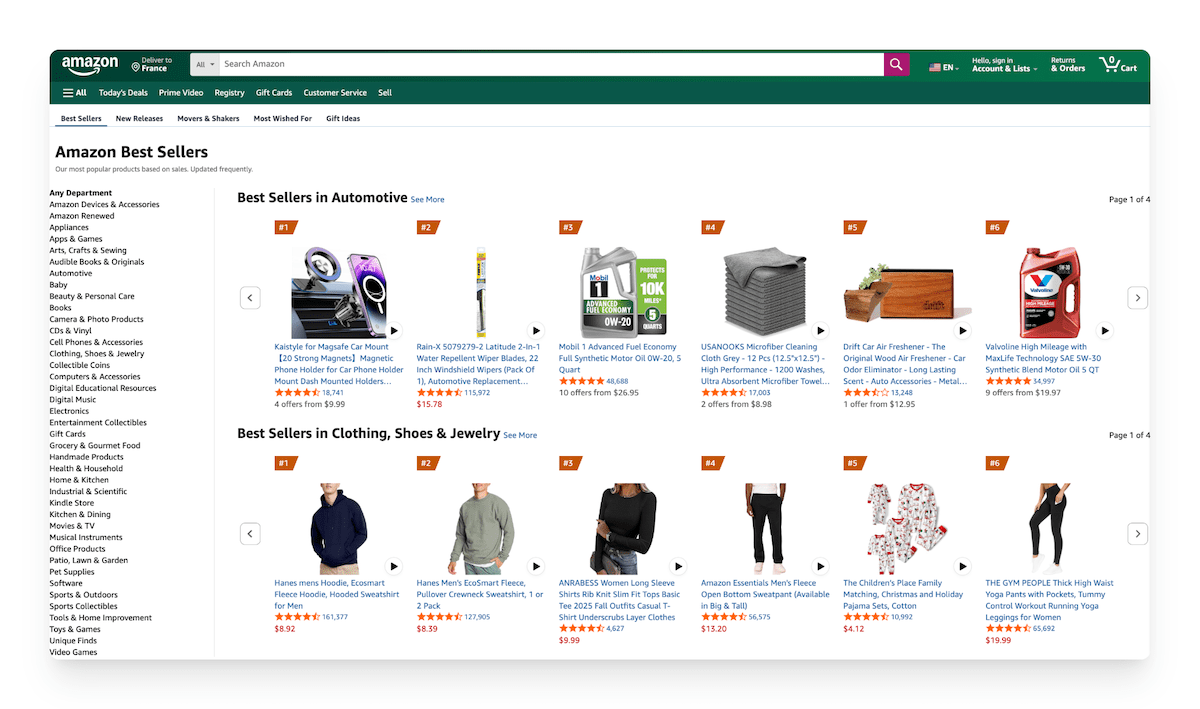
Amazon Best Sellers
Also consider your own interests and expertise; passion makes it easier to create authentic branding and marketing. Choosing a niche you genuinely care about helps you better understand customer needs and develop products that stand out.
2. Research products
The next step entails researching products within your niche. Look for goods that you can improve or differentiate, such as by using higher-quality materials, adding features, or offering better packaging.
In addition, you can study competitor listings, customer reviews, and pricing to understand what buyers like and dislike. This helps you spot opportunities to stand out.
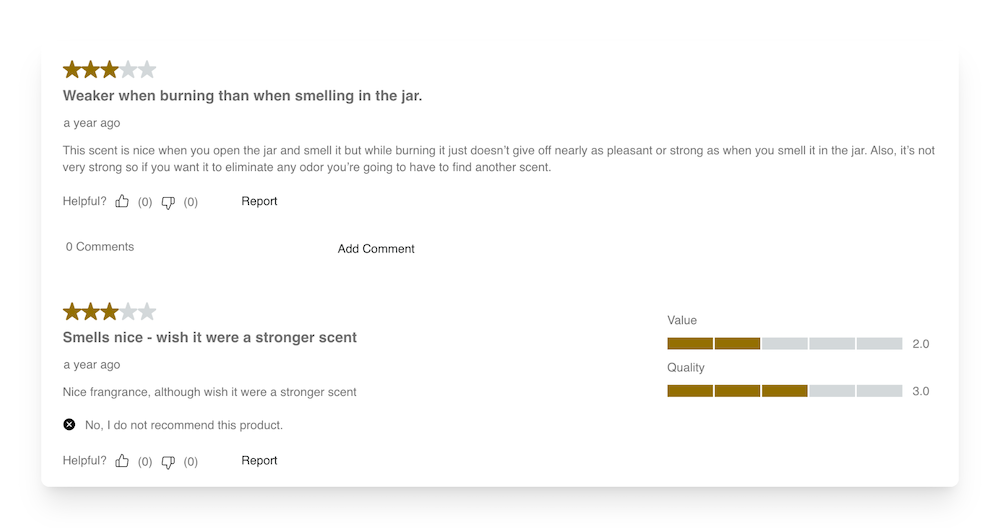
Reviews for a candle, indicating that consumers may be looking for more powerful scents
Remember to always evaluate potential profit margins, aiming for a markup that’s at least between 30 and 50% after manufacturing, shipping, and marketing costs.
Be cautious with highly saturated markets unless you have a clear unique selling point (USP) that makes your product meaningfully better or more appealing than existing options.
3. Find a manufacturer or supplier
The third step when starting a private-label business is finding a reliable manufacturer or supplier. Check out platforms like Alibaba, Global Sources, or ThomasNet to discover potential partners.
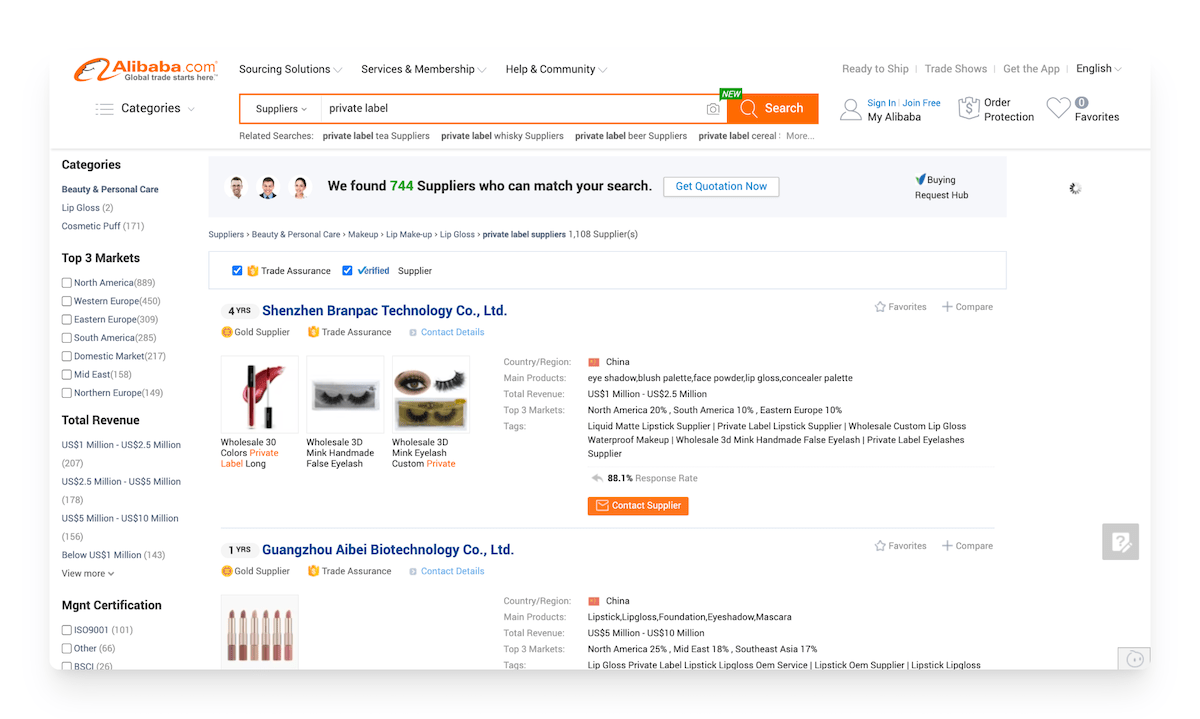
Private-label suppliers on Alibaba
Reach out to multiple suppliers to compare prices, minimum order quantities (MOQs), and production capabilities, being sure to always request samples to assess product quality before making a commitment. This helps avoid costly mistakes later.
During discussions, negotiate terms such as pricing, lead times, and payment options. Keep in mind that you will want to clarify branding possibilities like adding your original logo, custom packaging, or unique design features to ensure your private-label product stands out in the market.
4. Design your brand and packaging
With your private-label products chosen and suppliers found, it’s now time to develop a memorable brand name and logo that reflect your product’s identity and appeal to your target audience.
Your packaging should communicate quality and value, as it’s crucial for private-label products to create a strong first impression. Consider using eco-friendly or distinctive packaging materials to set yourself apart from competing retailers and appeal to conscious consumers.
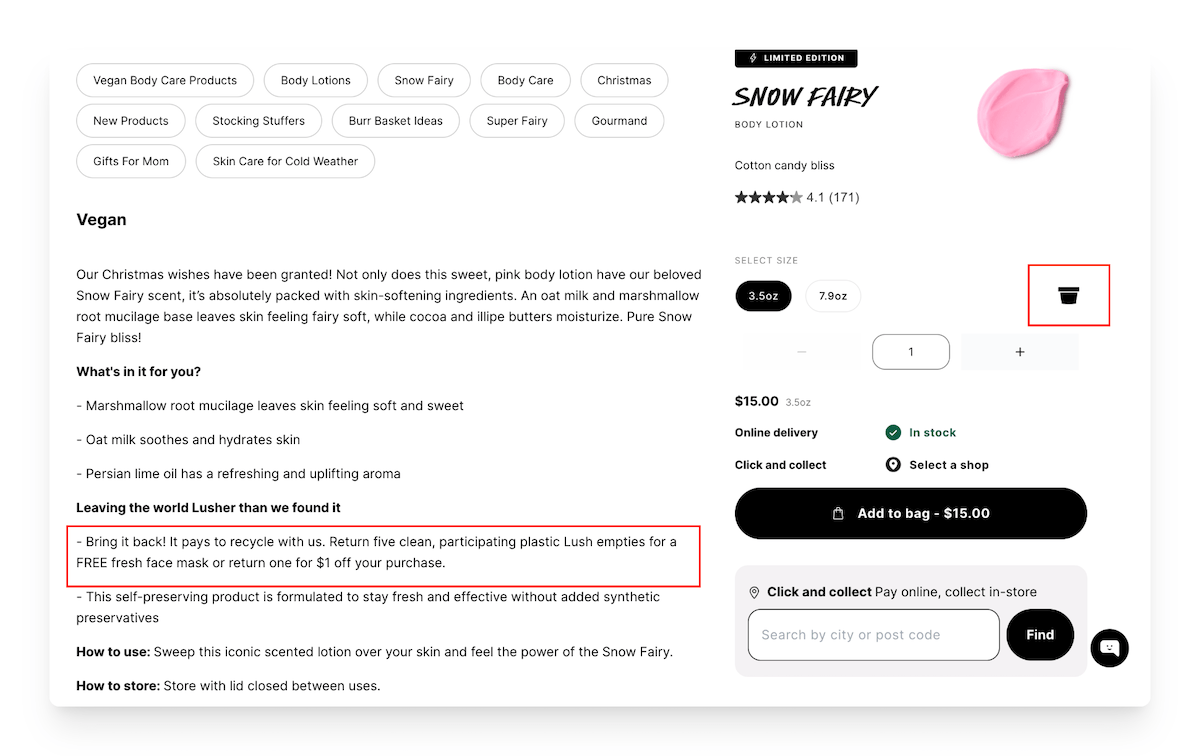
LUSH encouraging sustainability with its packaging by offering a free product or discount when customer return empty products
Finally, ensure that your packaging complies with all legal and safety labeling requirements in your target market, including ingredient lists, usage instructions, and certifications, to build trust and avoid regulatory issues.
5. Set up sales channels
You will next need to decide where you want to sell your private-label goods. While platforms like Amazon, Etsy, and Walmart offer built-in traffic and, in Amazon’s case, FBA for simplified fulfillment, it’s especially beneficial to build your own website for long-term brand control.
Using an ecommerce platform like WiziShop makes this easier, as it provides built-in SEO optimization, conversion-focused design features, guided workflows to help you create a professional store quickly, and all kinds of AI tools to generate all kinds of content for your website.
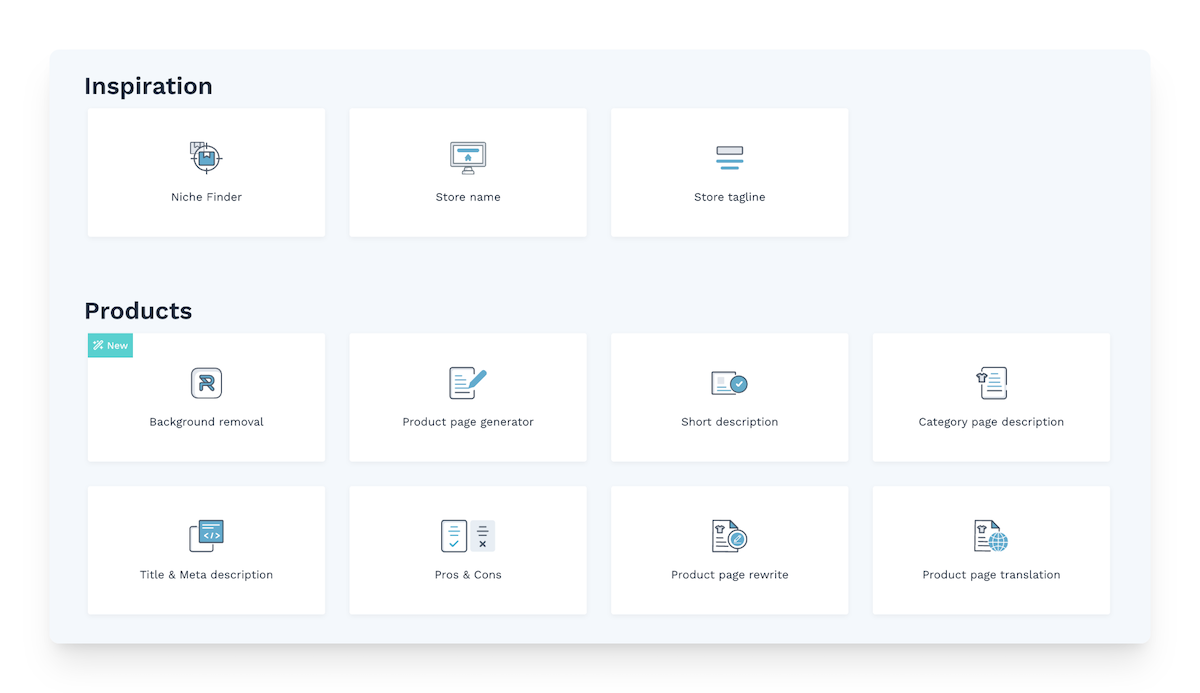
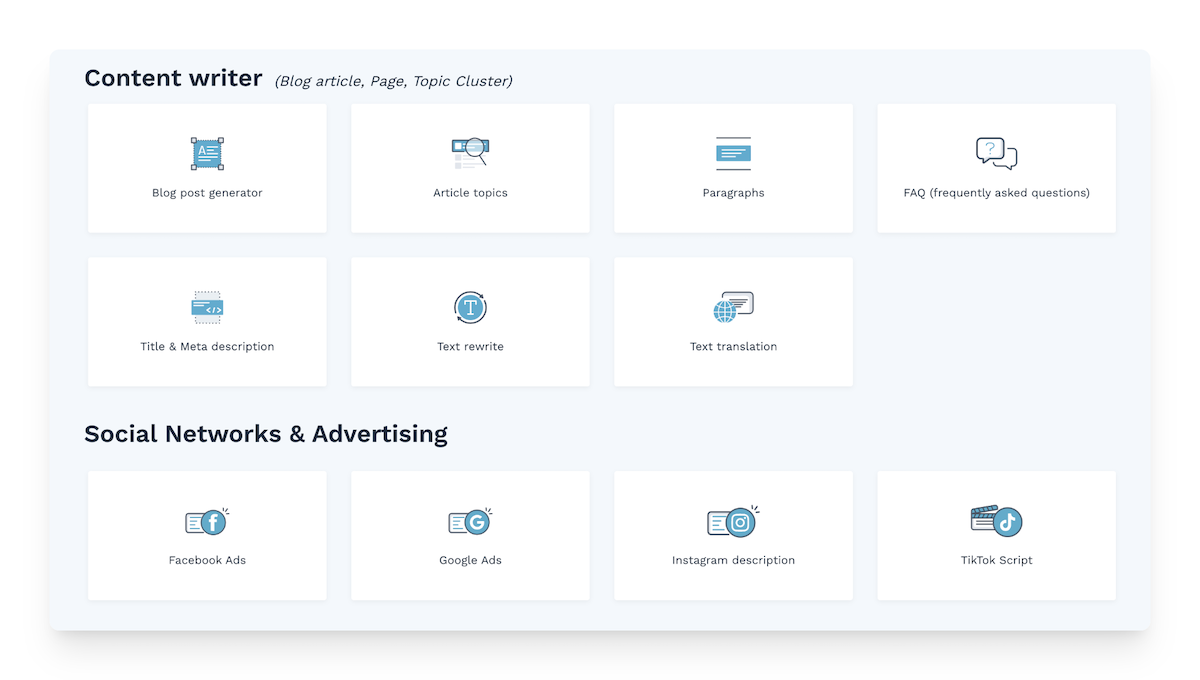
WiziShop AI features
What’s more, as a WiziShop merchant, you will have access to knowledgeable Business Coaches to assist you with any questions you may have concerning your business.
Try WiziShop free for 7 days
THE EASIEST NO-CODE ECOMMERCE SOLUTION✅ No credit card required
✅ Access to all features
✅ No commitment
With your own website, you control customer data, branding, and pricing without marketplace competition beside your products.
Regardless of where you sell, make it your goal to create strong product listings with high-quality images, clear and persuasive descriptions, and keyword optimization to ensure that your products are easy to find and appealing to potential customers!
6. Launch and market your product
After your sales channels are ready to go, you’re ready to get your offering out into the world and let people know that it exists. You can start by building anticipation through social media posts, email newsletters, or partnerships with influencers in your niche.
Farmacy Beauty building anticipation for its newest product on Instagram
When you launch, consider using paid ads such as Amazon PPC, Facebook/Instagram ads, or Google Ads (if your budget allows) to drive initial visibility and traffic. Encourage early buyers to leave honest reviews, as strong feedback builds credibility and trust quickly.
7. Scale and optimize
The final step is scaling and optimizing your private-label business. After your goods have been on the market for some time, analyze which products, sales channels, and marketing strategies generate the highest profits, and focus more resources on those.
You can then work on expanding your product line with complementary or upgraded goods to boost average order value and encourage customers to return for future purchases. As sales grow, negotiate better pricing or place bulk orders to improve profit margins.
Don’t forget to look for ways to automate fulfillment, inventory management, and marketing tasks so you can shift your attention from daily operations to strategic growth, brand-building, and developing new product opportunities.

With WiziShop, you can avail of a variety of marketing automation tools to facilitate the management of your online store, including automated email follow-ups to send to your site visitors and customers.
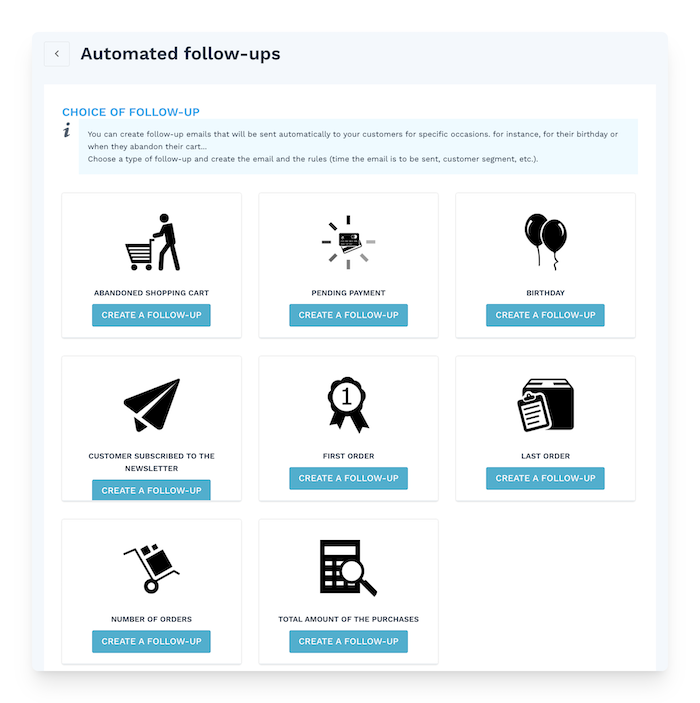
Automated email follow-ups available in your WiziShop administration area
Conclusion
Private-label products offer a powerful opportunity for businesses to stand out, increase profit margins, and build stronger customer loyalty. By understanding what private labeling is, recognizing the advantages it provides, and following smart sourcing and branding strategies, sellers can confidently bring unique products to market.
Whether you’re starting a small online shop or expanding an established brand, private labeling allows you to deliver tailored value that sets you apart from the competition. With careful planning, reliable suppliers, and a clear marketing approach, private-label products can become a sustainable and rewarding part of your business’s long-term growth.
FAQ
What is the difference between private-label and white-label products?
Private-label products are manufactured exclusively for one retailer who sells them under their own brand. White-label products are generic items that multiple sellers can brand and market.
Do I need a large budget to start selling private-label products?
Not necessarily. While there are upfront costs such as product development and packaging, many small businesses start with small order quantities and scale as demand grows.
How do I find a reliable manufacturer for private-label products?
Research suppliers through reputable platforms, request product samples, check reviews, and communicate clearly about expectations before placing larger orders.


